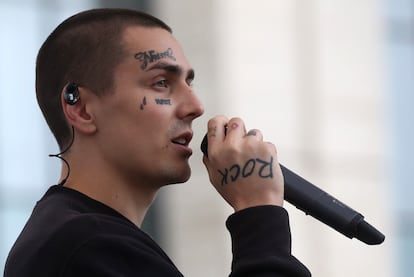FACE, the rapper who Putin accuses of being a spy: ‘The future of Russia belongs to people like me’
At 25, the first hip-hop artist and Instagram idol branded a traitor by the Kremlin leads the Russian music scene’s opposition to the war


There was a time in the Kremlin when photos of Vladimir Putin and the American rapper 2Pac hung together in government offices. It was during the period when Vladislav Surkov was the Russian president’s foreign policy advisor, from 1990 to 2011. The politician no longer works at the presidential headquarters, but hip-hop still matters to Moscow: this month, the government declared a rapper as a “foreign agent.” The artist in question is FACE, a rapper from Ufa, a city of just over a million inhabitants in the Russian republic of Bashkortostan. The musician has nearly two million Instagram followers, and he has been openly critical of President Putin, Russian society and the invasion of Ukraine. The young man heard the news on April 8, which happened to be his 25th birthday. He posted a mocking reaction on Instagram: “Thank you for the best birthday present! A great honor for me and a sign that I am doing everything right.”
The “foreign agent” label was created in 2020 to identify naturalized Russians who, according to the Kremlin, actively work for the interests of other countries and receive income from abroad. Several journalists have received this designation, which requires them to report at least once every six months to the Ministry of Justice about their funding and activities. But FACE, whose real name is Ivan Dryomin, left Russia before any of that happened. “I practically do not exist now as a Russian artist or as a citizen. I completely refuse to recognize this State as mine,” he wrote on Instagram weeks before, on the occasion of the invasion of Ukraine. The rapper, along with other figures such as Oxxxymyron or Morgenshtern, the most listened-to artist on Spotify in Russia in 2021, is one of the few who have dared to openly condemn Putin. They defy the government’s stipulations by speaking about the war, a word whose simple use has brought Russian activists sentences of up to 15 years in prison during the protests of the last two months.
FACE’s designation as a “foreign agent” is more evidence of Putin’s problem with the rap scene, whose popularity among the country’s youth has escaped his control. Although the artists never appear on official channels, their songs are broadcast on Telegram and YouTube through VPN networks, which allow Russians to access content from other countries. The Kremlin’s propaganda has spent years trying to absorb this subculture. The great representative of pro-government rap is Timati, who counts among his successes a song whose title translates to “Vladimir Putin is My Best Friend,” in which he describes the president as a “superhero.” Timati is also known for having a relationship with the Chechen warlord Ramzan Kadyrov and for having the dubious honor of having uploaded to YouTube the video with the most dislikes in Russia’s history: the song “Moscow” received almost a million and a half downvotes, and the rapper ended up withdrawing it to stop “the wave of negativity.”
Timati was the only rapper to participate last March in the Crimean Spring event, held in the capital to commemorate the eighth anniversary of the referendum with which Russia annexed the peninsula. At the celebration, 200,000 people proclaimed their adherence to the “military operation” in Ukraine. Other popular rappers, such as Boulevard Lepo, have preferred to remain neutral in the face of the conflict: “My music, as before, will not have any special social or political character. Music should be music and not someone’s propaganda tool,” he said.
FACE has posted on Instagram that he is “embarrassed” by the aggression against the neighboring country. “It is a fact that you, I and our descendants will have to live with,” he writes, also saying that he is hopeful about the change in mentality that he perceives among young people. The rapper rose to fame five years ago with a song translatable as “I’m Sinking the West,” a brutal satire in whose video he parodies institutional propaganda against the United States, using images of Putin riding bears. (Some interpreted it as a song favorable to the leader.)
FACE does have an alarming political history: as a teenager, the rapper belonged to the far right, as part of a soccer gang in Ufa. His group swore “allegiance” to Hitler to lead “racial holy war” when he was 15 years old. The artist, however, has publicly distanced himself from his old supremacist beliefs, and in several of his posts, he speaks disparagingly of Nazi Germany, comparing it with Putin’s Russia or expressing his “immense gratitude” to his great-grandfather, who fought as part of the Red Army on the Teutonic front.
“If he had known that, 75 years later, his people would proudly invent their own swastika [referring to the Z with which supporters of the invasion of Ukraine are represented in Russia] and would consider themselves the liberators of Europe, treacherously attacking a sister country that is 28.5 times smaller than ours in territory, he would rather shoot himself than continue fighting,” FACE wrote.
FACE is the first rapper to receive the “foreign agent” designation, but he is not the first musician. Last year, two members of the punk group Pussy Riot, Nadya Tolokonnikova and Nika Nikulsina, who have previously served prison time, earned the peculiar distinction. Unlike FACE, the two women, who caused a national scandal in 2012 by breaking into the Cathedral of Christ the Savior in Moscow to perform an anti-Putin song, have unequivocally defined themselves politically as anti-fascists, as well as feminists. A photo of Tolokonnikova, raising her fist and wearing a t-shirt with the slogan “No pasarán” (“They will not pass”) the motto of the Spanish resistance in Madrid against Franco’s advance in the Civil War, has become iconic.
They have not remained neutral in the face of the invasion of Ukraine. Tolokonnikova raised and donated more than $7 million to help the victims of the war. “It’s obvious that Putin is just a dangerous dictator who has to be stopped. He’s not just dangerous for people in his country, he’s dangerous for peace globally. A lot of people have been half-joking, talking about this invasion starting the Third World War. But it’s a war in Europe. It’s not a joke. It’s full-blown war,” she told Rolling Stone magazine.
Both Pussy Riot and FACE have positioned themselves in favor of the release of the politician Alekséi Navalny, attending protests in his favor. For them, the Ukraine that was born in 2014, after the Euromaidan movement, represents hope for the development of free democracies around Russia. “Ukraine is the only hope of the East Slavic peoples for democracy,” FACE writes on Instagram. “One day, Russia will become a worthy state, with people who have a modern and reasonable mentality, but today, unfortunately, that is not the case. I hope one day to see my family again, see my audience, sing in Russian for my people. And I think it will happen. Because whether everyone likes it or not, the future of Russia belongs to people like me, and not to people like you. The future of Russia is people who have brushes and microphones in their hands, not machine guns and grenades.”
Tu suscripción se está usando en otro dispositivo
¿Quieres añadir otro usuario a tu suscripción?
Si continúas leyendo en este dispositivo, no se podrá leer en el otro.
FlechaTu suscripción se está usando en otro dispositivo y solo puedes acceder a EL PAÍS desde un dispositivo a la vez.
Si quieres compartir tu cuenta, cambia tu suscripción a la modalidad Premium, así podrás añadir otro usuario. Cada uno accederá con su propia cuenta de email, lo que os permitirá personalizar vuestra experiencia en EL PAÍS.
¿Tienes una suscripción de empresa? Accede aquí para contratar más cuentas.
En el caso de no saber quién está usando tu cuenta, te recomendamos cambiar tu contraseña aquí.
Si decides continuar compartiendo tu cuenta, este mensaje se mostrará en tu dispositivo y en el de la otra persona que está usando tu cuenta de forma indefinida, afectando a tu experiencia de lectura. Puedes consultar aquí los términos y condiciones de la suscripción digital.








































